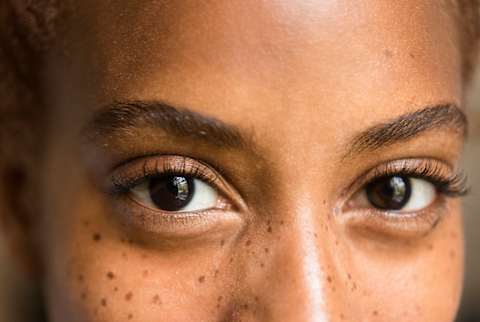“Jonathan just tested positive for Covid here this morning.” My son Dan called me from Copenhagen with the bad news. And he called just minutes before I was to fly there for a long-anticipated visit to Copenhagen, to visit Dan and his family. I was devastated. I knew it would be crazy at age 87 to head off to Copenhagen when someone in the household there had Covid. I canceled.
I had been reading and talking about Denmark for weeks and I found myself continuing to do research and hold forth on Denmark. And now, dear readers, I want to share some of the amazing information that I have learned and to tell you why what is going on in Denmark matters to each of us. Even if we never go there.
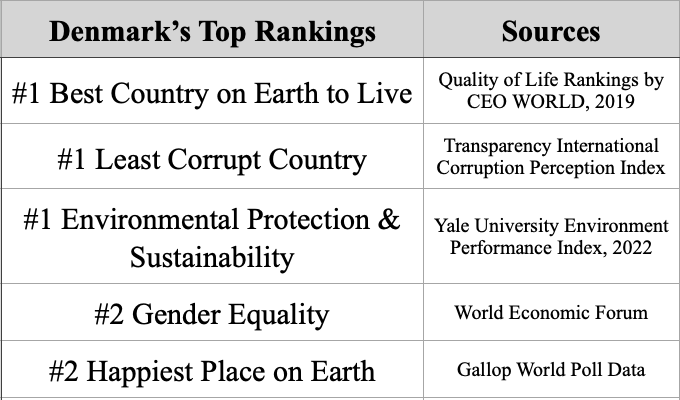
Denmark has been ranked as the best place on earth to live and also the best of all countries in terms of quality of life. It has been named as the least corrupt country in the world and number 1 in terms of protecting the environment and gender equality. It has been ranked the 2nd happiest country on earth, (after Finland) for the last three years.
What visitors to Denmark first notice are the many people riding bicycles. Patrick Kingsley in How to be Danish highlights the fact that more than 30% of people in Copenhagen commute to work on bikes and even children zip around the city alone. Visitors also note the abundance of public parks, urban gardens and public transportation.
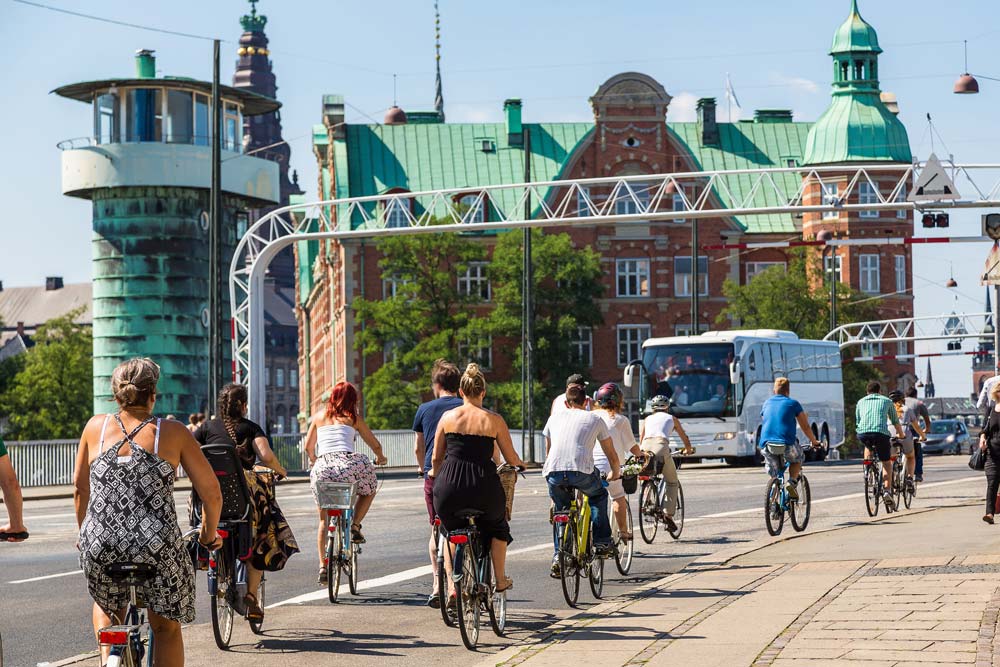
As visitors talk to some local people, they are immediately impressed by all the benefits provided by the government. Denmark has healthcare for all while also offering choice of providers. There is universal free education that includes childcare starting at age 8 months, schooling for all youth and free universities. Danish employees average only 34 hours of work a week and they receive 5 weeks of paid leave each year. They also have unemployment when needed and 32 or more weeks of paid leave when a new baby arrives. The gap between the top incomes and the lowest is far smaller than in the US. You may be wondering how all this is possible.
More facts. The Danish government functions effectively with the lowest rates of corruption of any country. And the government has been able to pass has aggressive laws to reduce carbon emissions and encourage wind and solar energy. And what I found most amazing is the fact that Denmark has only a few people living below the poverty line, just a mere .3%. This is while we in the US have 11% of our people living below the poverty line. I couldn’t believe it at first and kept checking out the facts.
Denmark has also been called one of the best places in the world to grow old. Everyone over 65 gets a pension and the government provides free or well subsidized housing for the old. Traditional large nursing homes have been outlawed and have been replaced by small homelike long-term care communities. Other options for people as they age are senior citizen residences, assisted living and aging at home.
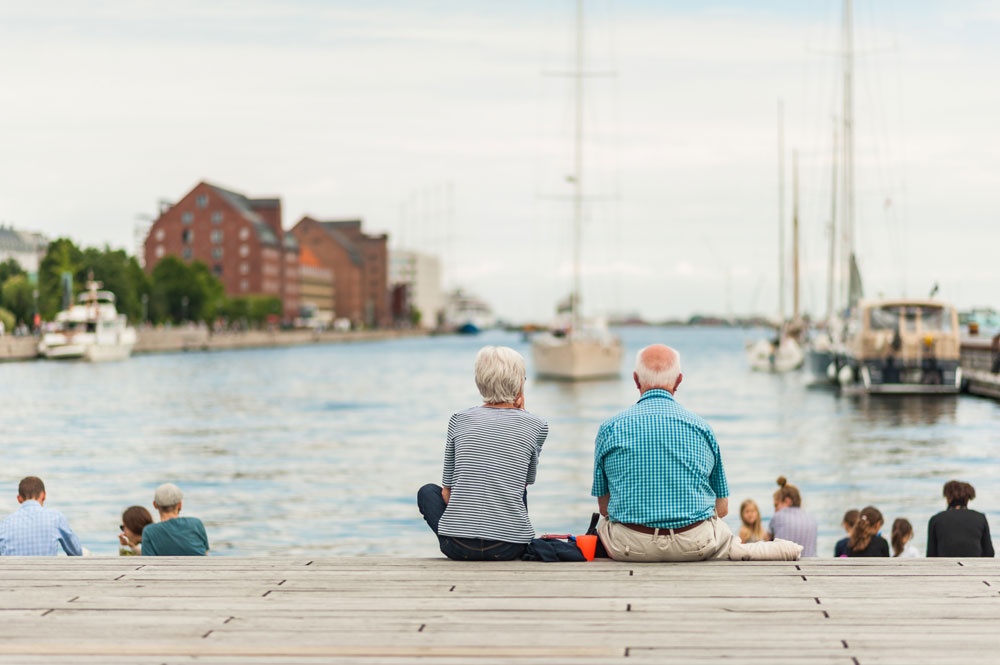
And trust is high. More than 70% of Danes believe people can be trusted according to Helen Russell, author of The Year of Living Danishly. This is twice as many as the average of their European neighbors. Randall explains that the trust is so high that most parents feel safe leaving their sleeping babies outside while they go into a store or cafe.
But, of course, you are thinking perhaps, there must be some downsides. And, of course, there are. Tax rates are at 50%. Americans are horrified by that. Women, as elsewhere, are paid less than men and fewer of them reach the top of big businesses. And before you start planning for your move to Denmark, I need to let you know that the winters are dark, cold and long. In midwinter the sun rises at 8:30 am and sets at 3:30 pm.
And there is a lack of diversity in Denmark. Less than 5% of the population of Denmark are immigrants and less than 2 % of the population is black. Danes used to tell visitors that that Denmark was a good place for immigrants. Today some people report troubling signs of racism and anti-immigration attitudes.
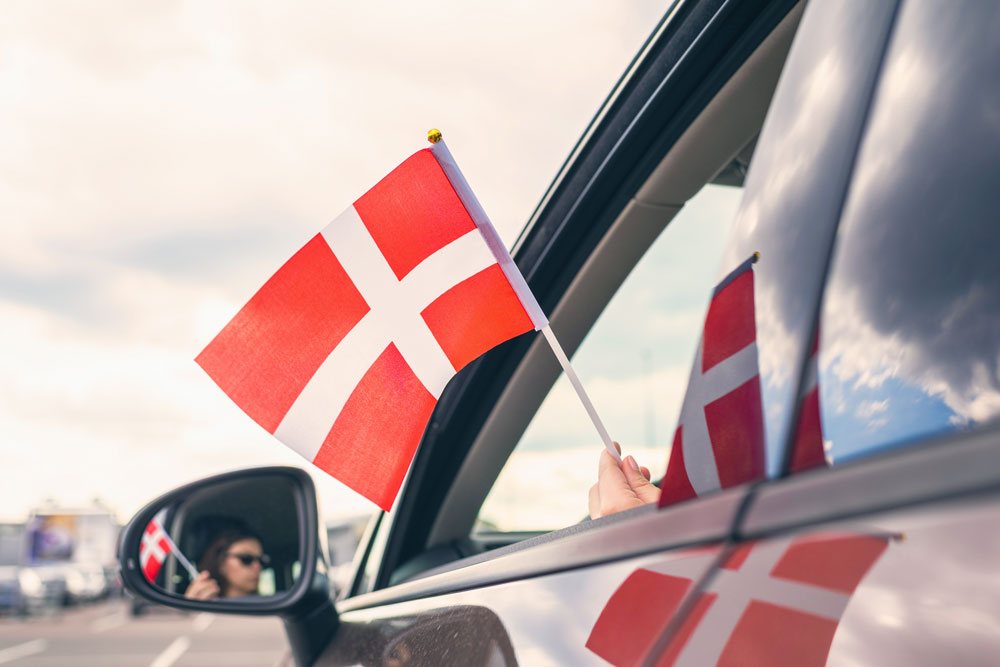
Dr. Mira Chandhok Skadegard of Aalborg University explains why so many of the Danes deny that there are any problems: “White Danes don’t experience racism.” And few share the immigrant experience.
Despite the challenges, Denmark remains stunning example of what a country can provide to its people and still prosper. We can learn much from their model. Here are four of my takeaways:
- It is possible for a country to enact laws that provide universal healthcare, free education at all levels, affordable childcare, unemployment and paid vacations and provide a quality life for all its people.
- It is possible to have an effective government with little corruption.
- It is possible to eliminate poverty to a degree we have never achieved here in the US.
- It is possible to implement an aggressive green agenda and still prosper.
Learning this, I found myself experiencing a growing upset, concern, disappointment and anger about many of the choices we have made in the US. Of course, these kinds of benefits are much simpler to achieve in a homogenous country of 4 million people compared to the US with its stunning diversity. But think about it. We, the richest country in the world, still have 28 million people who have no health insurance and more than 30 million live in poverty. We have let our public transportation systems deteriorate and childcare remains so costly that it is a huge burden for many families. And our youth are dying in unprecedented numbers from deaths of despair… drugs, suicide and gun violence.
We have foregone much needed infrastructure in the United States at the expense of the average citizen. Of course our tax laws (which greatly favor wealthy Americans, corporations, and special interest groups) would need to change in order for us to implement and manage large programs like those the Danes enjoy, but our standard of living would rise drastically. Interestingly, as Congresswoman Katie Porter recently pointed out, Medicare is an extremely efficient manager of medical benefits, spending only 1% on administrative costs compared to 17% in the private healthcare industry. These kinds of changes are financially feasible!
Denmark shows us that maybe we Americans have too small a vision of what is possible. Consider what the US has recently done to help Ukraine. And what we did in World War II. And how we got to the moon. I believe we can do more for our people.
I believe that we, the older generations, have a perspective that needs to be heard. We must continue to be politically active to work towards a kinder gentler country. And we must share our values, experience and resilience with younger generations who are struggling.
I will end with a quote from a Japanese Buddhist philosopher, Daisaku Ikeda.
Recognizing and treasuring the contributions of older people is essential to the long-term flourishing of any society.
Let me know what you think.
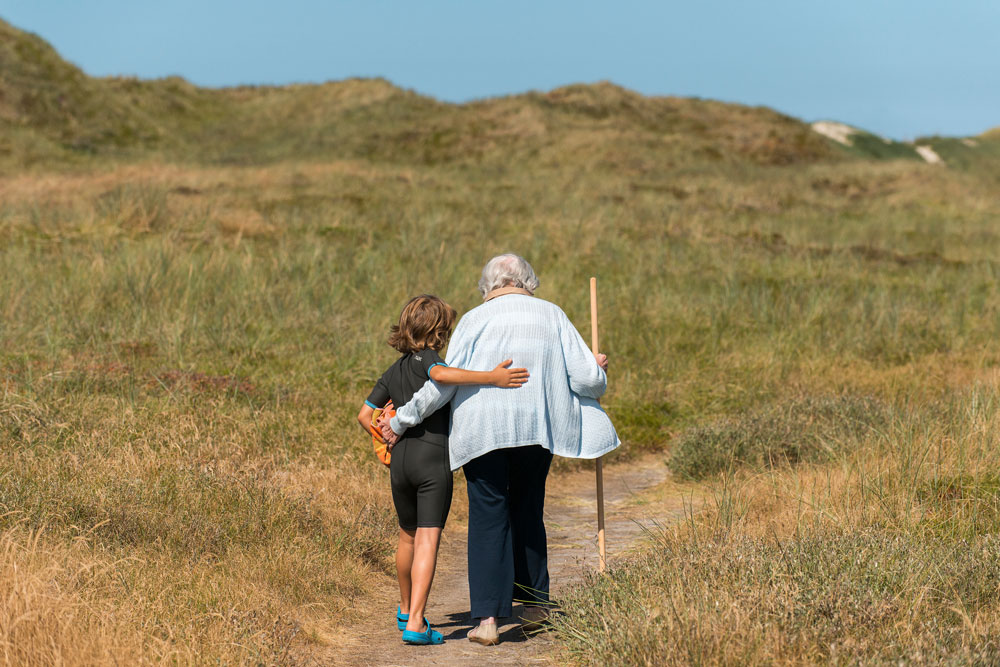
#agingwell #living #health #Denmark #society



